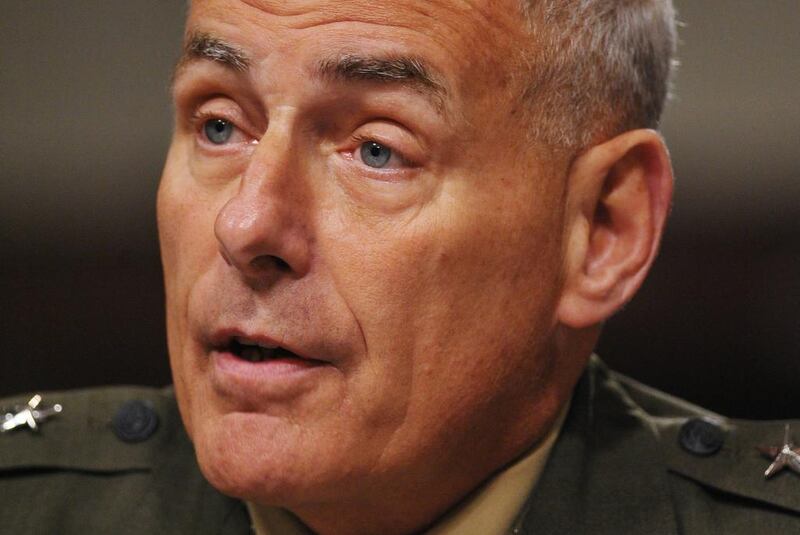NEW YORK // President-elect Donald Trump is building a cabinet of generals and billionaires, shaping the administration in his own image and provoking criticism it is out of touch with the voters who backed his insurgent campaign.
On Tuesday, he announced that ExxonMobil chief, Rex Tillerson, would be the next secretary of state, saying he "knows how to manage a global enterprise, which is crucial to running a successful state department".
Mr Trump selected General John Kelly on Monday as his pick to lead the department of homeland security and last week named billionaire Linda McMahon, CEO of World Wrestling Entertainment and former pro-wrestling magnate, to head the small business administration.
Critics fear that prominent business leaders will struggle to abandon awkward corporate ties in favour of national interest and that Mr Trump's obsession with military men risks undermining the principle of civilian control of the armed forces.
It is almost as if the president-elect is building an administration in his own image, according to some commentators.
Jeanne Zaino, professor of political science at Iona College, New York, said he had selected appointees who were known to be strong-willed and successful in their fields — whether military or business — but with little political experience.
"He is picking people who he feels comfortable with, on a personal level and he understands their backgrounds," she said. "It is similar to the way Donald Trump is."
Some of the appointments are not final as cabinet jobs must be approved by the senate. Already Mr Trump has picked retired Marine General James Mattis as defence secretary and retired Army Lieutenant General Michael Flynn as national security adviser.
Another retired general, David Petraeus, was an outside chance for secretary of state, while retired Admiral Michael Rogers has been linked to the job of director of national intelligence.
One more three or four-star general "and we can start referring to a Trump junta rather than a Trump administration", the former Army Lieutenant Colonel Andrew Bacevich told Time magazine.
Senior military figures offer an uncomplicated choice for Mr Trump. Most kept their political feelings to themselves during the bad tempered election campaign.
In contrast, several senior Republicans were outspoken in their criticism of Mr Trump's bombastic style and policy positions, effectively ruling themselves out of a position in his government.
At the same time, Mr Trump made clear his respect for the top brass. He frequently avoided making foreign policy or military commitments on the stump instead suggesting he would let US generals devise strategy once he was in office.
He has made no apologies for the make-up of his cabinet, saying he has selected individuals with a history of public service.
Last week, at a victory rally in Iowa, he compared his picks with elite athletes.
"I want people that made a fortune because now they're negotiating with you. It's not different than a great baseball player or a great golfer," he said.
His selection includes tycoons worth more than US$14.5 billion (Dh53.25bn) including billionaire investor Wilbur Ross as his commerce secretary, Betsy Devos, a billionaire philanthropist, as his education secretary, and Wall Street banker Steven Mnuchin as his treasury secretary.
Both Mr Mnuchin and Mr Ross have worked for Goldman Sachs, marking a bitter irony as Mr Trump savaged Hillary Clinton for giving paid speeches to the bank.
Their inclusion led one opponent, the Democrat Senator Claire McCaskill, to describe the cabinet as made up of "Goldman, generals and gazillionaires".
Prof Zaino points out while Wall Street executives and generals may in some cases be political neophytes, they are hardly the sort of anti-establishment figures that Mr Trump said he would bring in.
"Are people that voted for him in a year going to turn around and say this was an administration that promised one thing and did another, following an establishment, conservative, Republican agenda?" she said.
Left-wing opponents have also taken issue with the composition.
LeeAnn Hall, co-director of People's Action, said: "What Trump's cabinet appointees have in common is a track record of working in their own self-interest, not public service, and amassing personal fortunes, not fighting for working families."
Rex Tillerson, in particular, has been singled out for the baggage he would bring to the state department. As chief executive of ExxonMobil, his experience at striking deals makes him a cabinet member in the Trump mould, but his stint working in Russia for the company saw him develop ties with President Vladimir Putin and Igor Sechin, a former KGB associate who runs the country's state-controlled oil company Rosneft.
Bob Menendez, senior member of the Senate foreign relations committee, said those links made his nomination "alarming and absurd".
"The term conflict of interest doesn't even begin to describe the web of dubious business interests and bank accounts that Tillerson and his company Exxon shares with Vladimir Putin and Russian oil companies," he said.
Mr Trump is expected to unveil more appointments this week.
foreign.desk@thenational.ae
‘Goldman, generals and gazillionaires’ make up Trump’s team
Critics fear that prominent business leaders will struggle to abandon awkward corporate ties in favour of national interest and that Mr Trump’s obsession with military men risks undermining the principle of civilian control of the armed forces.

Editor's picks
More from the national




